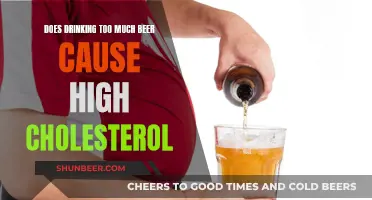
Drinking beer while cutting weight is generally not recommended, as alcohol is high in calories and can lead to poor food choices. However, some people choose to incorporate beer into their cutting diet by reducing their food intake or doing extra cardio to compensate for the additional calories. Ultimately, the decision to drink beer while cutting depends on individual preferences and goals, as moderate drinking may not significantly impact weight loss or muscle growth if calories are carefully tracked and consumption is limited.
What You'll Learn

Alcohol is not essential and is processed differently from other macronutrients
Alcohol is not an essential nutrient. When ingested, your body identifies alcohol as a toxin and works to remove it. It is processed differently from other macronutrients. Alcohol severely lowers the body's fat oxidation rate. A study published in the American Journal of College of Nutrition found that when men were given two drinks of vodka and sugar-free lemonade, their lipid oxidation dropped by 73%.
Lipid oxidation is a measure of how much fat your body is burning. So, even though the cocktails in question were only 90 calories each, they had a huge impact on the drinkers' fat-burning power. Rather than getting stored as fat, alcohol is converted to a substance called acetate. In the study, subjects had a blood acetate level two and a half times higher than normal. This sharp rise in acetate puts the brakes on fat loss.
Of the 24 grams of alcohol that was consumed in the study, only 3-5% was turned to fat. Our body responds to alcohol much as it deals with excess carbs. Alcohol isn't necessarily evil because it's always stored as fat, but because it reduces the amount of fat your body burns for energy.
Alcohol is calorically dense and can temporarily hinder fat metabolism. A 12-ounce glass of regular beer contains about 150 calories, while a light beer has about 100 calories. A 5-ounce glass of wine has about 100 calories, and a 1.5-ounce serving of distilled alcohol (gin, rum, vodka, whiskey) has about the same.
If you are trying to lose weight, cutting back on alcoholic drinks can boost your efforts. Alcohol can cause weight gain in a few ways. First, it is high in calories. Some mixed drinks can contain as many calories as a meal but without the nutrients. Second, you may make poor food choices when drinking. Studies show that people tend to make poor food choices when drinking alcohol.
While you do not have to entirely cut out alcohol, you may need to consume it more mindfully. You should watch the number and type of drinks you choose and keep an eye on how drinking affects your eating habits. Health experts recommend that anyone who drinks should do so in moderation. This means no more than one drink per day for women and no more than two drinks per day for men. You may want to drink even less than that to lose weight. Remember that alcohol has empty calories. This means it has calories (7 per gram) but no nutrients.
Drinking Beer in Public: What's the Legal Take?
You may want to see also

Alcohol is calorically dense and can hinder fat metabolism
Alcohol is calorically dense, with 7 calories per gram, almost as many as a gram of fat. A standard glass of wine can contain up to 158 calories, and a pint of strong lager can contain up to 222 calories. A gram of alcohol provides 7.1 kcal of energy, and the energy consumed from alcohol is additive to that from other dietary sources. This means that alcohol can be a contributing factor to weight gain if not compensated for.
Alcohol is considered a toxin or waste by the body, which prioritises metabolising it over other nutrients such as fat. This means that fat oxidation is inhibited, and any surplus dietary fat will be stored, leading to weight gain. Alcohol also does not affect satiety like other nutrients, and it encourages overeating by impairing judgement.
The thermogenic effect of alcohol is high, and it takes a lot of energy to process it. This means that the net caloric intake from alcohol may be lower than 7 kcal/g. Some researchers have questioned whether alcohol calories "count" at all, as a surplus of calories from alcohol intake did not result in the expected fat gain.
Heavy drinking is more consistently related to weight gain than light-to-moderate alcohol intake. Binge drinking and heavy drinking can lead to fat gain by inhibiting fat oxidation and promoting food intake. However, moderate alcohol intake does not seem to lead to weight gain, according to experimental evidence.
Neoprene Beer Coolers: How Do They Work?
You may want to see also

Alcohol can make you want to eat more
It is possible to drink beer while cutting, but it is not recommended and can negatively impact your progress. If you are trying to cut, it is best to limit your alcohol consumption and practice mindful drinking.
Drinking alcohol can increase your appetite and make you want to eat more, even if you are full. This is because alcohol stimulates the same neurons in the brain that are triggered when the body goes into starvation mode. It also affects the hormones that regulate hunger, such as Leptin and GLP-1, by suppressing or inhibiting them. As a result, you may start feeling hungry after a few drinks, even if your body doesn't need more food.
Additionally, alcohol suppresses the oxidation of fatty acids, which contributes to feelings of hunger as fatty acids play a role in appetite regulation. It also increases short-term thermogenesis, or calorie utilization, which can make you feel hungry again faster than usual.
The combination of impaired inhibitory control and increased appetite can lead to overeating and poor food choices. People often crave and consume high-fat, high-salt, and high-carbohydrate foods after drinking alcohol. These foods are typically easily accessible and may be more appealing to our taste buds when under the influence of alcohol.
To curb alcohol-induced food cravings, it is important to prepare and plan ahead. Here are some strategies to help you manage your appetite and make healthier choices:
- Pace yourself and drink responsibly. Slowing down your drinking can reduce biochemical disruptions that can lead to overeating.
- Drink water. Alternating between alcoholic drinks and water can help you stay hydrated, support your liver and kidneys, and make you feel more full.
- Eat a nutritious meal before drinking. Having food in your stomach will help you absorb alcohol more slowly and make you less likely to give in to cravings later.
- Prepare healthy snacks in advance. Having healthier options readily available can help you make better choices when drunk.
- Be realistic and accept that drinking alcohol may increase your chances of succumbing to food cravings, regardless of your willpower.
By implementing these strategies, you can enjoy the occasional drink while cutting without completely falling off track with your fitness and nutrition goals. However, it is important to remember that excessive alcohol consumption can affect your recovery, performance, and overall health. Moderation and mindful drinking are key to maintaining a balanced lifestyle.
Pouring Beer: Catfish Bait or Urban Myth?
You may want to see also

Alcohol can be part of a healthy meal plan when used sparingly
Alcohol is not an essential nutrient. When ingested, your body typically identifies alcohol as a toxin and works to remove it. Alcohol is calorically dense and can temporarily hinder fat metabolism. It has seven calories per gram, and is processed differently from other macronutrients.
However, when used sparingly, alcohol can be part of a healthy meal plan. A German study assigned 49 overweight subjects to one of two 1,500-calorie diets. The first group's diet included a glass of wine every day, while the other group drank a glass of grape juice. The wine group lost 10.4 pounds, while the juice drinkers lost 8.3 pounds.
Health experts recommend that anyone who drinks should do so in moderation. This means no more than one drink per day for women and no more than two drinks per day for men. Keep in mind that alcohol has empty calories. This means it has calories (seven per gram versus four per gram for carbohydrates and protein) but no nutrients. In order to drink alcohol while cutting back on calories, you need to plan it into your daily calorie count so you do not exceed it. Remember that when you drink alcohol, you are replacing potentially healthy, and filling, food with calories that will not fill you up.
If you want to drink alcohol while cutting, you can make room for a few hundred calories of alcohol by eating less carbs and fats that day. The first thing to pay attention to is the calorie content of each type of drink. As a rule of thumb, the sweeter the beverage, the more calories it has. If you want to get a little drunk, it's best to go with low-calorie drinks such as spirits. If you drink for the taste, go with cocktails, beer or wine.
However, it is important to note that moderate drinking does not interfere with muscle growth or strength. But heavy drinking does affect recovery and performance. It also puts you in a calorie surplus, leading to fat gain.
Does Beer Affect Your Period?
You may want to see also

Alcohol lowers the body's fat oxidation rate
Secondly, alcohol is high in calories or "kilojoules" and can cause weight gain, especially in the midsection, leading to "alcohol belly fat". Alcohol also increases feelings of hunger, leading to poor food choices and overeating. However, heavy drinkers may lose weight due to skipping meals and consuming only alcohol.
Thirdly, alcohol interferes with physical activity, which is essential for fat oxidation and weight loss. Heavy drinkers tend to be less active, which, combined with the excess calories from alcohol, can lead to weight gain.
Finally, alcohol affects the liver, which plays a crucial role in metabolic processes and fat oxidation. Excessive alcohol consumption can lead to alcoholic fatty liver disease, damaging the liver and impairing its ability to metabolize and store fats and carbohydrates. This further disrupts the body's fat oxidation processes.
Beer and Yeast Overgrowth: Is There a Link?
You may want to see also
Frequently asked questions
Yes, but only in moderation. Alcohol has a high number of calories and can lead to weight gain. It can also affect your eating habits and lead to poor food choices.
Health experts recommend drinking in moderation, which is no more than one drink per day for women and no more than two drinks per day for men. If you want to lose weight, you may want to drink less than that and plan your drinking into your daily calorie count.
If you want to drink while cutting, low-calorie drinks such as spirits are a better option. Cocktails, beer, or wine are good choices if you're drinking for taste.







